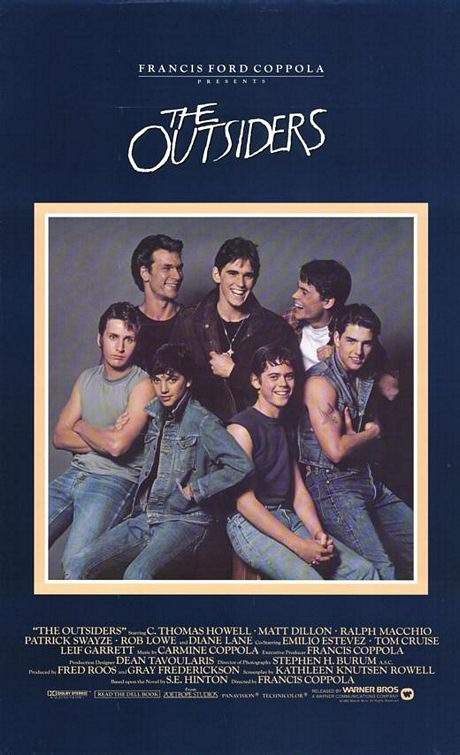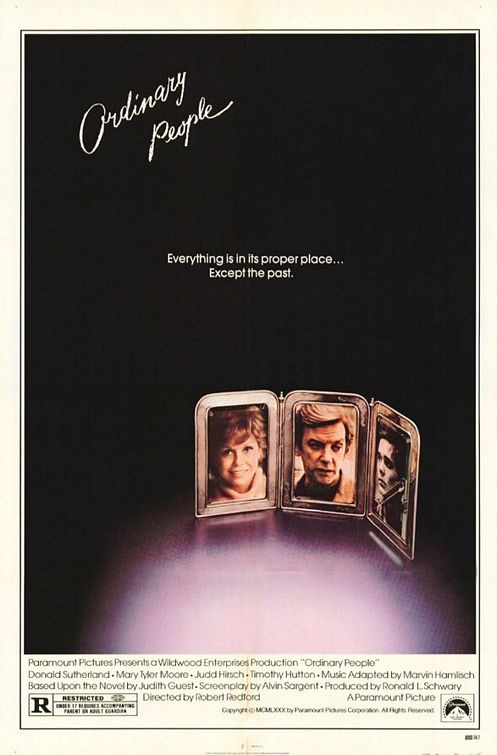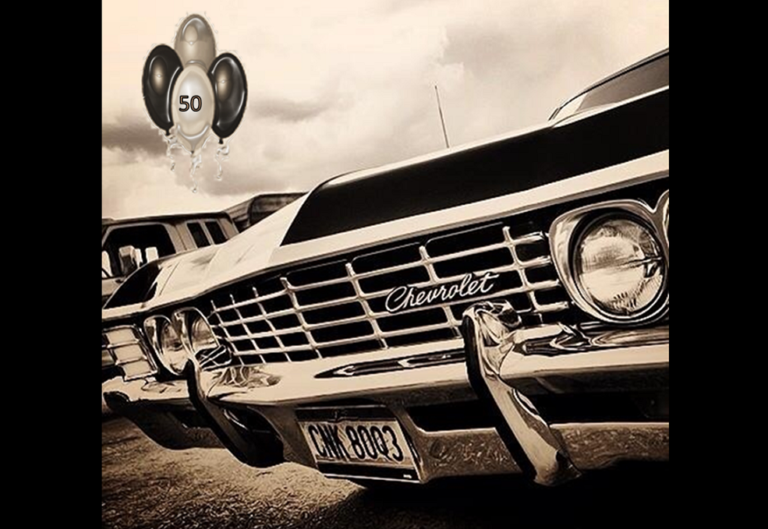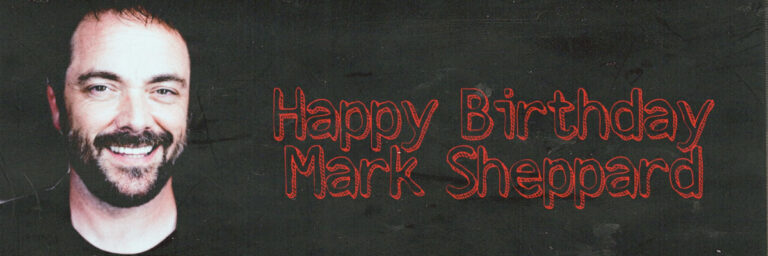The Winchesters: The OUTSIDERS who are just ORDINARY PEOPLE

“We’re all we’ve got left. We ought to be able to stick together against everything. If we don’t have each other, we don’t have anything.” (The Outsiders by S.E. Hinton)
The Winchesters are often described as “outsiders”. They see themselves in that light, especially when they use it as a synonym for “freak”. They operate outside the law, and they live on the fringe of society. In fact, the theme of this season, as described by Sera Gamble and Bob Singer, is that the boys are outlaws, a la Butch Cassidy and the Sundance Kid.
But for all their “outsider” street cred, they’re still ordinary people. They may hunt monsters, be killed and resurrected at an alarmingly frequent rate, and be extraordinarily handsome, but in many ways, they’re still average folk. They need food, a place to sleep, and people to love. That makes them a lot like the rest of us.
“Just as Conrad knows that it is love, imperfect and unordered, that keeps them apart, even as it holds them somehow together.” (Ordinary People by Judith Guest)
I raise the issue of Sam & Dean being “The Outsiders” yet “Ordinary People” because of a woman who’s playing an extra in the upcoming episode “Slash Fiction”. She’s supposed to appear in the crowd scene in a diner. Her name is S. E. Hinton. (It’s actually Susan Eloise, but it’s always been S.E. to her readers.)
Hinton is the author of a series of books detailing the trials and tribulations of a group of teenage boys. Like the Winchesters, Ponyboy, Sodapop, Rusty-James and Tex have it rough. They face many difficult, heartbreaking situations ““ absent parents, abuse, discrimination and poverty. But they know the value of love and laughter, and in their world, friendship and family mean everything. (Sounds a bit familiar, doesn’t it?)
Her characters don’t have magical powers, and they’re not sparkling vampires or lean, handsome werewolves. They don’t fight Evil, or hunt ghosts, although many of her boys are haunted by their own demons. But they do resemble the Winchesters in the fact they want to do what’s right. Generally, they want to help or save people. And sadly, like Sam and Dean and Castiel, they’re often damned by those good intentions.
As a teenager, I was drawn to Hinton’s books because they were so realistic and honest, her characters so believable. You couldn’t help but fall in love with Ponyboy’s innocence, Dallas’s badboy charm and Darry’s steady strength. They practically leapt off the page and into my living room. (Oh, how I wished for that! Especially after Matt Dillon played a couple of the characters in movies. C’mon! I was young, and he was hot!)
Hinton’s novels paint a painfully accurate picture of the lines that divide us, and how those divisions can shape the course of someone’s life. But they also offer hope. Each of the books carries a message about redemption, love, the importance of communication, and why we really need to see the person, not the façade. (Hello, Dean. I’m addressing the last comment to you! Open up already!!!!)
I will be watching for S. E. Hinton, and silently thanking her for the gift of her gritty stories, and the legacy she’s created ““ a legacy that continues to this day, in characters like Sam & Dean.
But, Hinton is not the only author I see reflected in Supernatural. On my bookcase, right beside my old, yellowing copy of “The Outsiders”, is another teenage favourite. It’s “Ordinary People” by Judith Guest.
If it sounds vaguely familiar to you, it’s because it was made into an Academy-Award winning movie, directed by none other than Robert Redford, and starring Mary Tyler Moore, Donald Sutherland and a young Timothy Hutton.
“Ordinary People” tells the story of one family trying to find a new normal after the drowning death of their eldest son Jordan, aka Buck, in a boating accident. His younger brother Conrad survived the accident, but nearly succumbed to his subsequent grief. The book begins just after Conrad’s release from hospital following a suicide attempt.
I’ve been thinking a lot about the book lately, as I watch Dean fall further and further into depression and despair.
Conrad is very similar to Dean. He too has closed himself off from his feelings, because in the wake of his brother’s death, he feels too much. And he just can’t deal with all that pain.
Here’s Conrad telling his girlfriend why he tried to kill himself. “It was like falling into a hole and it keeps getting bigger and bigger, you can’t get out. And then all of a sudden it’s inside you. It is you, and you’re trapped, and it’s all over.” He goes on to say that at the time, hurting himself seemed to be the only way to climb out of the hole.
Sounds a lot like Dean, who expressed the same sentiment in “Heaven and Hell”, when he confessed to Sam that he in order to end his own torture, he began torturing other souls. “How I feel… This… inside me… I wish I couldn’t feel anything, Sammy I wish I couldn’t feel a damn thing.” His constant drinking is an attempt to numb those feelings, to make the pain go away.
As well, both Conrad and Dean are wracked by survivor’s guilt. Each wonders why he was spared, while his loved one is dead, or damaged. Conrad can’t wrap his head around the fact his brother – who was better at everything, including swimming ““ let go of the boat and drowned.
Likewise, Dean has always considered himself unworthy of attention, or salvation. So, he can’t deal with the fact he’s here and mainly whole, while Castiel is gone and Sam’s mind is broken.
In “Shut Up, Dr. Phil”, the older sister of victim Wendy talks about how much she looked up to her perfect younger sister. I think that was meant to show how Dean has always admired and respected Sam, and perhaps wanted to be more like his brother. He sees Sam as smarter, more compassionate, just a better person all around, and definitely a person worth saving.
That’s the same way Conrad viewed his brother Buck. And that’s why the fact he’s alive and Buck is dead is so difficult for him to comprehend, and accept.
The climax of “Ordinary People” is this beautiful breakthrough exchange between Conrad and his therapist Berger.
Berger: Kiddo, let me tell you a story, a very simple story. About this perfect kid who had a younger brother. A not-so-perfect kid”¦ Along comes this sailing accident and the impossible happened. The not-so-perfect kid makes it. The other kid, the one he has patterned his whole life after, isn’t so lucky. So where is the sense in that, huh? Where is the justice?
Conrad: There isn’t any.
Berger: Wait a second. Let me finish. The justice, obviously is for the not-so-perfect kid to become that other perfect kid. Only that is one hell of a burden, see? So, he finally decides he can’t carry it. But how to set it down? No way. A problem without a solution. And so, because he can’t figure out how to solve the problem, he decides to destroy it. It’s a very far-out act of self-preservation”¦Nobody needs you to be Buck. It’s okay to just be you.
Conrad: I don’t know who that is anymore!
Berger: Yeah, you do.. That guy is trying so hard to get out, and he’s never gonna be the one to hurt you, believe me. Let him talk. Let him tell you what you did that was so bad. You hung on, kiddo. That’s your guilt. You can live with that can’t you?”
Oh, how I wish someone could deliver Berger’s speech to Dean too. The real Dean (bad-ass and extremely skilled at hunting, but still caring and intelligent) wants to come out and play too. He’s been shut away for such a very long time.
Dean never patterned himself after Sam, but he is certainly struggling to find his identity. Dean’s always judged himself in relation to other, Sam’s protective big brother, Castiel’s ally. He’s sensing he can’t do that anymore.
I also think Dean is still struggling with his guilt over torturing other souls in Hell. Intentionally inflicting pain on others was a nightmare come true for him. However, in some ways, deciding to get off the rack and torture can also be viewed as a far-out act of self-preservation. Perhaps he was trying to save himself, until he could be saved.
In “Ordinary People” Berger reminds Conrad that feelings – good and bad – are what make us human, and what make life worth living. In fact, they’re what life is all about!
Berger: Feeling is not selective. You can’t feel pain, you’re not going to feel anything else either. And the world is full of pain. And joy. Evil. Goodness. Horror and love. You name it, it’s there. Sealing yourself off is just going through the motions. Got it?
Contrary to what Famine told him, Dean isn’t empty. He’s full of emotions. He’s failed spectacularly at sealing himself off from his feelings. He’s in such turmoil now, because he feels too much. But at this point, it’s the highly negative emotions that are closest to the surface. Guilt, remorse, and self-loathing are all threatening to drown him, and make him lose his grip on the boat, just like Buck.
What I really appreciate about “Ordinary People” is that Conrad ultimately finds his own path out of the darkness and into the light. When the book begins, he is lost, and looking for direction. By the end, he is a young man who recognizes his own worth, and is excited by the opportunities he sees in front of him. Plus, he has rediscovered his sense of fun, and enjoyment. Conrad gets some help along the way, but the lessons he learns are all his own. They form the foundation for his better, brighter future.
I hope Dean can make the same journey, and arrive at the same destination. I think he is starting on that path. Obviously, he will need the support and guidance of Bobby and Sam, but he’ll do most of the hard work on his own.
It would be so wonderful if, along the way, he could rediscover some of his old childlike joy and spark. The younger Dean had a natural enthusiasm and optimism about life. He and Sam both need that positive energy now. Dean’s Stone Number One will be making peace with, or at least coming to accept, his strengths and weaknesses. When he does that, he will have created a solid foundation for himself, and for those he loves.
It will be a long, rocky road for Dean. However, if he’s looking for a little assistance or advice, or just some light-reading between Leviathan hunts, he could do worse than pick up a copy of “The Outsiders” or “Ordinary People”. Sometimes those “teen novels” sum up relationships and life pretty well.
“Stay gold, Ponyboy. Stay gold.” (The Outsiders by S.E. Hinton)






Wonderful article. Those are two books that I remember fondly from high school. Both of them seem to mirror the Winchesters in so many ways.
Also, did you know that S. E. Hinton is a big Supernatural fan? Pretty cool, huh? 😀
A great read, Pragmatic Dreamer. It’s also served as a reminder to find my copy of The Outsiders and reread. It’s mad the way I forget about great books until I’m reminded of them. Course, it might also be a reminder to sort out my library.
I haven’t read ‘Ordinary People’. A visit to Amazon might be in order.
Thanks for this.
Never read “Ordinary Peopleâ€, but wow, Dean does remind me of Conrad.
I think that Dean created a “Dean†for the world. And you’re right, this Dean existed in relationship to others. Dean at first was little John, out to please his father and fill a hole in the family dynamic. Dean grew to be that “blunt little instrumentâ€, and although he seems to have shed his father’s skin (literally because he can’t and doesn’t wear the leather jacket anymore), he is still “the big brother†to both Sam and Castiel. He failed Cas and for that he will blame himself for the leviathans on the lose.
I am beginning to think that real Dean was a sensitive soul who was damaged and hardened by John’s poor parenting.
I also just watched season four’s “It’s a Terrible Lifeâ€. I wonder if that Dean, the guy with the tie, and the Prius, and the rice milk, is partly who Dean is naturally without all the memories of Hell and his “failings†(which I put in quotes because they are only failings from Dean’s point of view, not really). I think of how he behaved in that episode and how he was still a leader, naturally smart, devoted to the job, personable, health conscience, inquisitive, yet stable and somewhat conservative. Would this have been Dean?
It’s interesting to wonder what the 10% of Dean that isn’t “crap†is! I want to see Dean come out of this his own man, unafraid.
I LOVE S.E. Hinton’s The Outsiders, Tex, RumbleFish and That Was Then, This Is Now.
I think you’re right. The Winchesters are in the same type of emotional place vis-vis the readers/viewers as the characters in those novels. They’re tough, yet vulnerable. They evoke those same types of emotions – empathy, protectiveness and romantic-hero-ish (in me at least)as those characters did. *coughMattDillonwassoooohotcough*
I’m so geeked out that S.E. is a Supernatural fan! Its perfect!
You’ll never believe this but the day before you put this up — I was recapping the movie Ordinary People for my daughter (we were talking about Chris Kane and Leverage and Tim Hutton and what else he had been in) and I actually made the same parallel to Dean and the survivor’s guilt.
I never read the book, but enjoyed the movie very much.
Anyway thanks for this – great article!